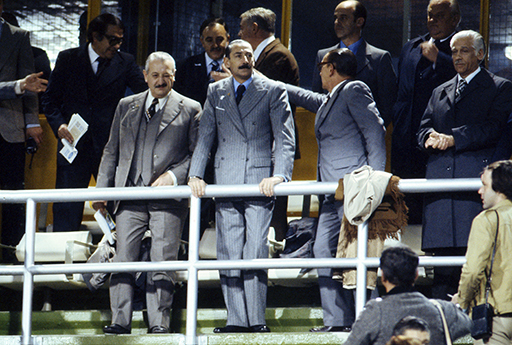2 How has FIFA responded to international politics?

Despite a desire to be apolitical, several international events have challenged FIFA’s ethos to remain impassive, or as Jiménez-Martínez and Skey (2018) put it, ‘politically avoiding the political’. In the next activity you will look at the infamous men’s 1978 World Cup hosted in Argentina.
Activity 2 Is doing nothing an option for FIFA?
Read the article Remembering Argentina 1978: The Dirtiest World Cup Of All Time [Tip: hold Ctrl and click a link to open it in a new tab. (Hide tip)] by Hersey (2018), which should give you an understanding of the political backdrop of the tournament. Then listen to the audio from Professor Alan Tomlinson who talks about the 1978 World Cup and, more specifically, the Argentina vs Peru match which caused suspicions of match fixing.
Transcript: Audio 1 Alan Tomlinson on the 1978 World Cup
As you engage with both sources, consider FIFA’s stance in relation to what is being discussed. What political factors were at play which might explain why they didn’t intervene?
Discussion
The 1978 World Cup came at a time when the highly oppressive Argentinian government needed to renew legitimacy to their 1976 military coup and seek consensus from civil society. FIFA were reluctant to involve themselves in the internal politics of a host nation. Furthermore, FIFA may have felt it too late to secure another host for the tournament emphasising a stance of impartiality for the governing body’s own gain. The article infers that FIFA’s apolitical stance was, in fact, extremely political. Ensuring the success of the tournament at all costs appeared a key motivation for FIFA. Despite accusations of match-fixing in the Argentina vs Peru tie (where the hosts needed to win by four clear goals to progress to the final – they won 6-0), FIFA didn’t investigate. In 1978, ‘doing nothing’ certainly was FIFA’s main approach.
There are several further examples of nations participating in World Cup tournaments despite their involvement in political and civil unrest include, such as: France during the 1950s despite their bloody wars against movements of independence in Algeria and Indochina (Szymanski, 2022), while Nigeria was permitted to play in World Cup qualifiers for the 1970 Mexico tournament while engaging in a brutal civil war with Biafra which caused more than one million deaths (Nwaubani, 2020).
Activity 3 Firm action or bowing to pressure?
Despite several instances where FIFA didn’t act amid global political challenges, their suspension of Russia in 2022 highlights a different approach. Read the article FIFA’s suspension of Russia is a rarity – but one that strips bare the idea that sport can be apolitical by Professor Stefan Szymanski for The Conversation and consider the following questions:
- Why does Szymanski believe FIFA acted against Russia, but not other nations embroiled in political conflict?
- How does Szymanski suggest FIFA, and other sport authorities, could better handle issues of political upheaval throughout the world?
- How do you respond to his suggestions?
Discussion
- Szymanski suggests that Russia’s brutality was one reason for their suspension, as was the innocence of Ukraine in the conflict. He also cited the sympathy shared throughout Europe where many top Ukrainians play domestically.
- Szymanski infers some criticism of FIFA, suggesting that they responded after public pressure in their actions. However, he advises that organisations should develop long-term policies which consider the legality of suspensions and bans and focuses on developing a consensus regarding ethical standards and participation.
- This is a very subjective issue. Szymanski acknowledges the challenges of his suggestions. For example, excluding nations could weaken the prestige of the World Cup. Additionally, by creating human rights-based criteria could lead to several other nations barred from future events which could threaten the tournament.
